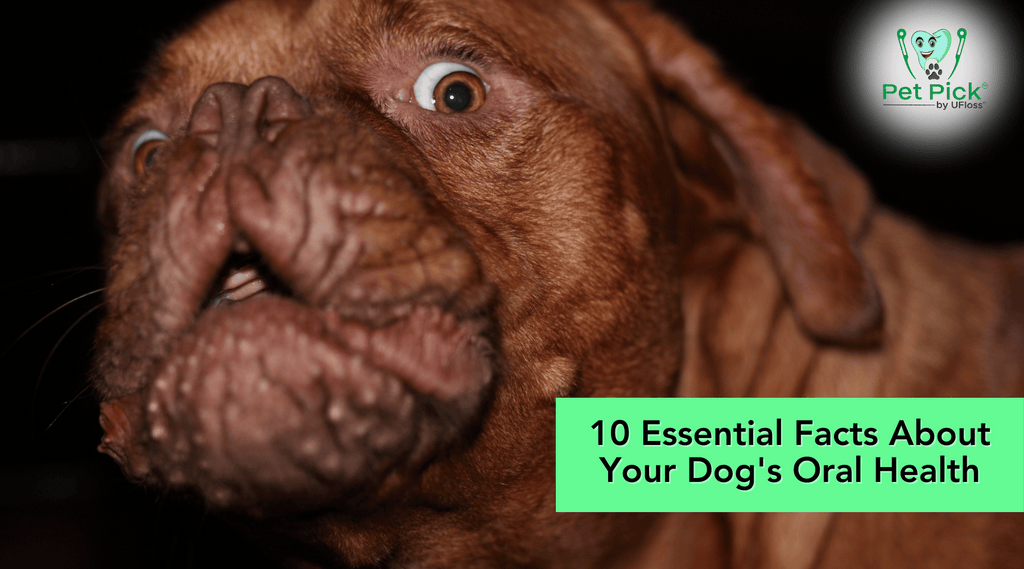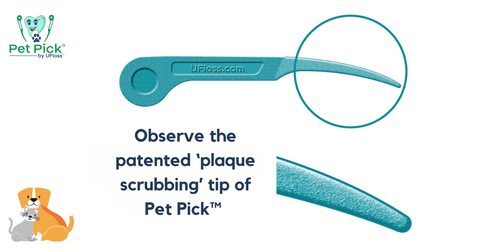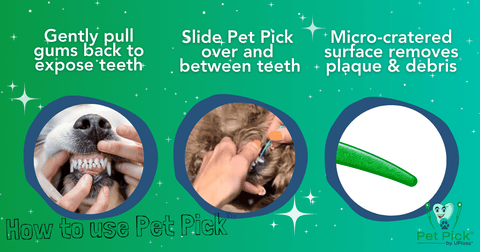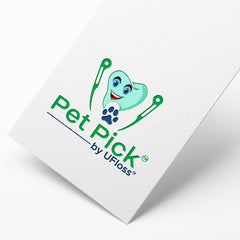10 Essential Facts About Your Dog's Oral Health

Brush aside doggy breath and bad gums – here are 10 dog dental facts to wag your tail about (courtesy of Pet Pick by UFloss™!)
Veterinarians witness the silent tragedy of dog dental disease all too often. It lurks behind seemingly harmless bad breath, silently compromising your furry friend's health and well-being. While regular checkups and cleanings are crucial, proactive care at home is the true game-changer.
That's where Pet Pick steps in – not just as a cleaning tool, but as a revolution in canine oral health. This innovative design tackles the hidden enemies between teeth and under gums, the areas traditional brushing often misses. It's safe, effective and surprisingly enjoyable for your pup, making home care not just feasible, but even pleasurable.

Prepare to witness the transformative power of a sparkling smile and wagging tail – the joy of healthy teeth is a gift you can give your four-legged companion every day. So, join us as we delve into the 10 essential facts every pet owner must know about their dog's oral health, with Pet Pick as our trusty weapon in this noble battle. Let's give our furry family members the healthy smiles they deserve!
- Dental disease is the most common health issue in dogs: Over 80% of dogs by age 3 show signs of dental disease, making it even more important than ear infections or skin problems.
- Bad breath is just the tip of the iceberg: While stinky breath might be the first sign you notice, underlying problems like gum inflammation, painful tooth infections, and even jawbone loss can be happening silently.
- Prevention is key, and it starts early: Just like humans, regular brushing and flossing (or chewing specially designed dental treats) are crucial for preventing plaque buildup and tartar formation. Start puppy oral care habits early for lifelong benefits.
- Diet plays a big role: Nutritional balance is key to oral health. Crunchy kibble helps clean teeth, while sugary treats and table scraps contribute to plaque and tartar. Consider dental diets or treats specifically formulated for oral health.
- Not all chew toys are created equal: Choose rubber or nylon toys that help scrub teeth as dogs chew, avoiding soft plush toys that harbor bacteria.
- Regular dental checkups are essential: Just like with humans, yearly dental checkups and cleanings by a veterinarian are crucial for identifying and addressing early signs of dental disease before it becomes serious and painful. So keep your pet's mouth clean and healthy!
- Broken or chipped teeth need attention: Don't dismiss a seemingly minor chipped tooth. Untreated, it can lead to infections and require more extensive treatment later.
- Small breeds are even more susceptible: Their crowded mouths and smaller teeth make them particularly prone to dental problems. Pay extra attention to their oral hygiene.
- Dental health impacts overall health: Untreated dental disease can lead to heart, kidney, and liver problems, highlighting the importance of oral care for your dog's overall well-being.
- It's never too late to start: Even senior dogs can benefit from a dental checkup and improved oral hygiene practices. Don't write off their oral health due to age.
Remember, a healthy, happy dog starts with a healthy mouth. By incorporating these facts into your dog's care routine, you can help them maintain bright smiles, avoid painful problems, and live a longer, healthier life.
If you're ready to start your pet's journey toward a healthier, happier mouth, head over to the UFloss store where Pet Pick is available now!



